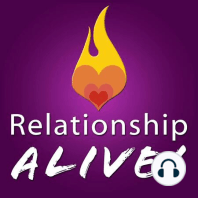61 min listen

12: How to Turn Your Anger into a Force for Good with Harriet Lerner
12: How to Turn Your Anger into a Force for Good with Harriet Lerner
ratings:
Length:
54 minutes
Released:
Nov 10, 2015
Format:
Podcast episode
Description
When was the last time you got really angry? And...how did that go for you? Was it a positive experience, or...not? And...do you and your partner know how to use your anger to foster growth in your connection? The reason I’m asking is that today’s guest is Harriet Lerner, Clinical Psychologist and author of the classic book The Dance of Anger which has sold over 3 MILLION copies worldwide. Harriet is one of the world’s most trusted experts on the topic of relationships, and her work has inspired countless others on the topics of Anger, Intimacy, Trust, Fear, Courage - you name it. Today we’re going to dive deep to talk about how to make your anger a force for good in your relationship. On top of that you’ll also get some words of wisdom that aren’t just about anger, but that are also about how to identify and change the patterns that are holding you back in your relationship. If you need help with understanding and processing anger, then join my enlightening conversation with Harriet as she addresses the following: Anger—what is it? Can it be useful? Anger doesn’t have to be a negative emotion. After all, it’s part of what makes us human and helps us define “self.” Anger is a vehicle for personal, social, and political change. “The pain of our anger preserves the dignity and integrity of the self.” In other words, when you’re feeling angry, that probably means that there is some place where you are ignoring your needs and betraying yourself. Many people use anger in relationships for purposes that aren’t useful. Many people get angry with ease, but they don’t accomplish anything useful with their anger! If anger is a way to blow off steam, but doesn’t actually generate positive change, then it’s not serving its purpose. Or some people avoid anger altogether. Another way that we mismanage anger is by AVOIDING conflict. This leads us to avoid any CLEAR statement of self that will “rock the boat” in a relationship. So it temporarily buys you peace, but at the cost of being fully yourself in relationship. And if you can’t be fully yourself, then you can’t fully meet your partner. What is the connection between gender and ways of handling anger? Our culture is more comfortable with women who are guilty, apologetic, and self-doubting than with women who are angry and want to challenge the status quo. Too often, anger is associated with feminism (“those angry feminists”) and is taboo for women. That all being said, managing anger wisely is a universal challenge for ALL of us, regardless of gender. The BIG Question = How do we transition from nonproductive to productive anger? Anger is a difficult emotion because we are wired for FIGHT or FLIGHT when we encounter most any problems. In order to turn anger into something useful, we need to become good observers of what is going on. The first step is noticing that you’re getting angry. Once you can become a witness to your anger, you are empowered to change YOUR part in the patterns that lead to anger being toxic versus being a vehicle for growth. What might you notice in yourself as a precursor to anger? Often, when you’re in full-on anger, it’s not the right time to try to resolve a situation. Can you identify the micro-changes within you that lead up to fight-or-flight? Does your heart-rate change? Does your face feel flushed? Where is your attention focused? Do you start to get defensive? In these moments, when you recognize that something is going on, do your best to see it as a sign that something within you needs to be recognized. Take space if necessary, to get clarity. Don’t focus on being “right” or “winning” - focus on getting yourself back to a place of connection within - and love/compassion for your partner. Learn to deal with countermoves and resistance to change in yourself and your partner. “Countermoves” are ways that a partner tries to hook you back into the old patterns when you are trying to change. If you have patterns in the way that you interact with your partn
Released:
Nov 10, 2015
Format:
Podcast episode
Titles in the series (100)
06: How to Deepen Intimacy Through Shared Consciousness with Patricia Albere: Are you curious about ways to build intimacy that aren’t about sex or being sexual? Have you had hints of feeling a deep connection with your partner, and are you interested to know how you might be able to deepen that connection even further? My... by Relationship Alive!